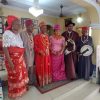The Federal Executive Council (FEC) on Wednesday approved the national automotive policy in a bid to stop the importation of fairly used (Tokunboh) cars into Nigeria.
The council also approved a total sum of N41 billion for the provision of road and other infrastructures in the Federal Capital Territory (FCT).
The Minister of Information Labaran Maku, and his Trade and Investments counterpart, Olusegun Aganga, told State House correspondents at the end of the meeting chaired by President Goodluck Jonathan, said the new automotive policy is to encourage local manufacture of vehicles.
Aganga disclosed that in 2012 about $3.4 billion (N550 billion) was spent by Nigerians importing cars while in 2010, the sum of $4.2 billion (N670 billion) was spent, indicating that car import takes the biggest share of the country’s foreign reserves followed by other machinery.
The new policy when fully effective will ensure the creation of minimum of 700,000 jobs in the auto industry.
He further explained that the new policy followed nine months of work with input from the National Automotive Council and foreign car manufacturing giants like Toyota and Nissan that are to announce their specific investments in Nigeria soon.
Aganga stressed that the bane of similar policies in the past, like non-implementation of policies, lack of infrastructure, and inappropriate tariff regime; were considered and adequately addressed in the new one, with even the Federal Road Safety Corps and local vehicle assembly plants/manufacturers involved.
Aganga outlined the highpoints of the new policy to include the establishment of three automotive clusters in Lagos/Ogun; Kaduna/Kano; and Anambra/Enugu states to share resources and reduce cost of investments, as well as the
development and revival of the petrochemical and metal/steel sectors and the tyre manufacturing industry to support the automotive sector.
Also, the Industrial Training Fund (ITF) is working with car-maker, Cena of Brazil, to open automotive training centres in Nigeria while two Nigerian universities have agreed to commence degree programmes in automechanical engineering, all in a bid to provide adequate local manpower for the industry.
Furthermore, appropriate tariff regimes to discourage car imports and encourage local manufacture will be put in place while government will continue taking the lead in patronage of locally made vehicles.
Banks will be encouraged to operate vehicle purchase schemes to enable Nigerians purchase cars on easy terms and the FRSC will kick off a new vehicle car registration/tracking system in the next two weeks to check the smuggling of used cars into the country.
courtesy – The citizen









